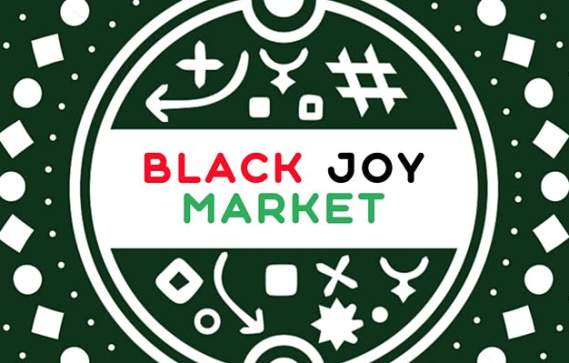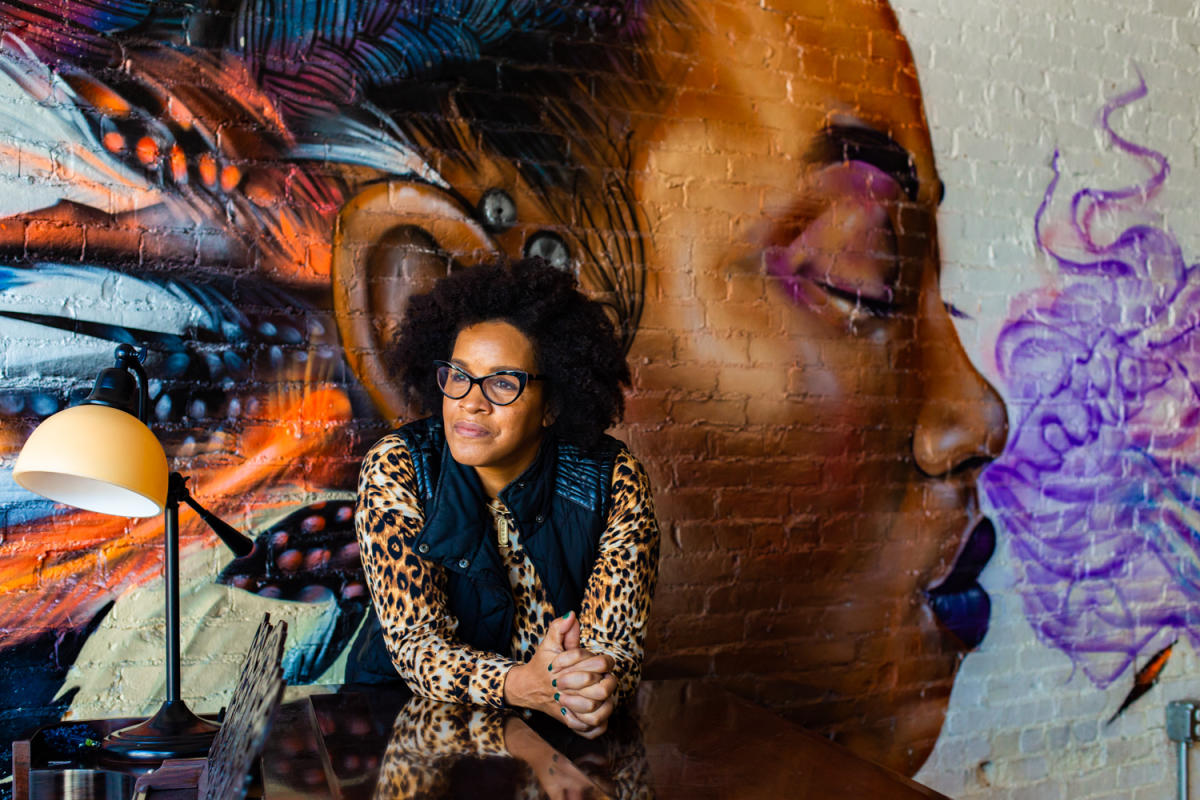
An Interview with Kai Grant and Rob Gibbs
Meet Boston:
We've had a lot of people talk about the renaming of Dudley Square to Nubian Square in Roxbury. I know you were involved in that from a community standpoint, both the renaming and the importance of it from a cultural pride standpoint and how you got there.
Kai Grant:
It's actually interesting because it's a year ago today that we were voting on this as a community. The City of Boston got a chance to chime in, but more specifically the communities in and around Nubian Square got a chance to have their voice be heard. The Nubian Square Coalition, which was led by Chuck Turner and Sadiki Kambon, had this idea to pay homage to the new Nubian Notion business, which had its roots in Roxbury for over 50 years before they closed their doors and also to pay homage to the heritage, the black heritage of Nubian Square or Dudley Square, at the time. The vote went through, 60% of Roxburians voted yes, to have it renamed to Nubian Square. And as stakeholders in Nubian Square, at Black Market Nubian, we decided to think about it from a comprehensive standpoint and add an economic development piece through the arts.
Meet Boston:
Rob, can you talk a little bit about the importance of that community investment coming together? Also, what it means to you to be part of something like the Nubian Square Public Art Initiative.
Rob Gibbs:
There are generations that are connecting through this initiative. To walk through Nubian Square more than half of my life, there's a history that I've developed there, alongside my family. To continue that lineage and for people to have an investment in the area, I think they have to see themselves in it to lead to that moment. Art does a very powerful thing, especially during this time, the pandemic, that it is the unspoken word, and I think it is being heard very loud right now.
We're curators of the culture, we're stakeholders with our lifestyle and just practices. And I just want to make sure that whatever we can do, we are showing people better than we can tell them. The initiative is so important to the community because the people that would witness the initiative in action will see a reflection of themselves, as we are curators for our culture, and what we can continue to contribute towards the future by honoring the past in the spirit of Sankofa. Everything that I can talk about in reference, people will be able to see an example. People will be able to see the expression through the artwork.
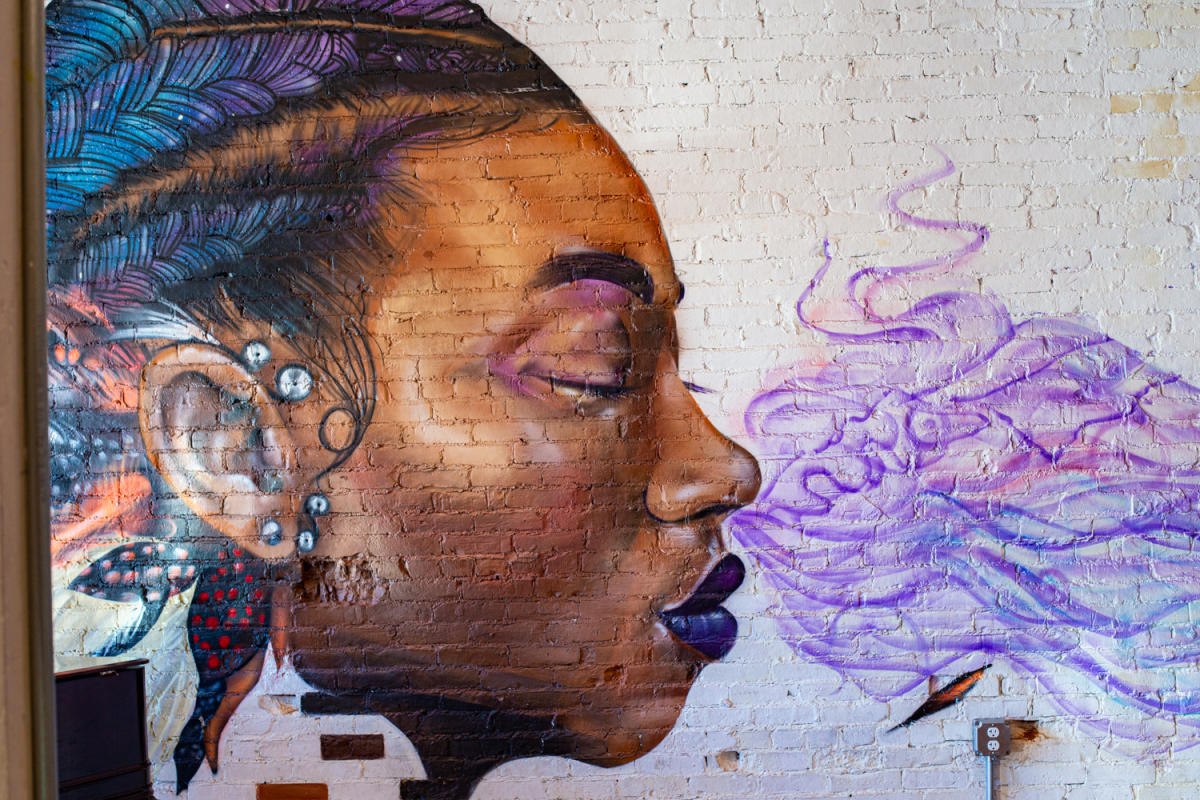
Mural by Rob Gibbs at Black Market Nubian
Meet Boston:
Would you mind talking to us a little bit about the inspiration for the Breathe Life series?
Rob Gibbs:
The inspiration behind the Breathe Life series: It is a call for action. It's a responsibility that was given in reference to the way that I was brought up in the household, in the community, in the areas that I've walked and talked, and to be able to leave some level of positive messaging without standing on top of a soapbox and doing it through this practice of hip hop culture that I've embraced as a young person.
I feel like with the message of Breathe Life, there's such a time that we're challenged to think about things that are celebrated on social media that are negative. It's normalized some very ugly moments that we need to just look at differently. And I feel in Boston, we have a responsibility for our own to be able to uplift through a positive message. It came from practicing and listening to any type of hip hop with the message of Breathe Life. It was birthed from just the need to say something.
"I wanted to pay homage to the areas that I've walked in and was brought up in and just know that the next generation of young people who will be looking at these murals will have something that they see themselves in." - Rob Gibbs
They'll see the influences. And I know that the story that I was developing, wasn't going to be told in one piece. We've also witnessed that a picture can be worth a thousand words, but I felt like it doesn't have to happen in one particular moment. It can happen throughout the years. The Breathe Life series has been developed over the past three years. And in these three years, I think the highest level of impact that we've experienced as a culture has been happening to this moment, to this day, to this conversation.
And if I can have an ability to chronicle that through positive messaging, that was the purpose of Breathe Life. I've put it in places with the intention of "this is where I've been at." This is kind of the footprint to my path. And I know others have walked that, and the support that I received is ridiculous in the best way possible. I feel like where the mural chose its place is the areas that it's been curated; Black Market Nubian is the lab, Black Market is the dojo, so I can practice that in comfort. I can take out to the street with confidence and be able to deliver these messages.
Knowing what conversations I get into, what ways I need to speak for some of us that don't feel like we have a voice. And most important, I have a daughter that I'm raising, that I'm leaving messaging inside the murals that she may not understand what I'm talking about right now, but she'll see it in the pieces when she grows up in the future.
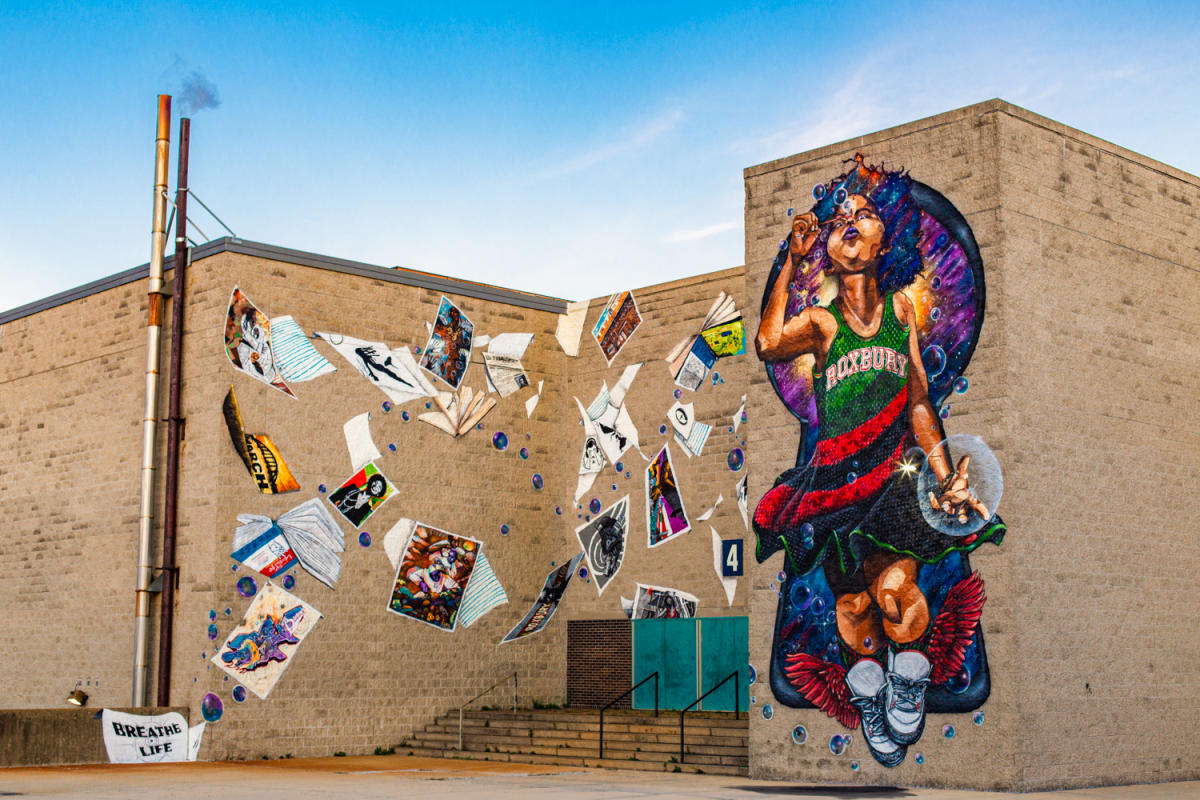 Breath Life Mural by Rob Gibbs
Breath Life Mural by Rob Gibbs
Meet Boston:
His remarks reference Black Market Nubian is the lab. Can you talk about Black Market Nubian as a lab, an incubator for creative energy?
Kai Grant:
It's interesting, in today's world around the globe, art is recognized as a luxury. For us, art is our life. It is the center of our beings as curators, as artists, whether your medium is via paint, whether you started as a graphic artist or street art. Or whether your work is being displayed at the Museum of Fine Arts, for the black community, art is not just a weapon, but it's also a healing tool. And so, for Black Market to be that lab and be the epicenter for Nubian Square and for the Nubian Square Public Art Initiative to have its roots within arts and activism is extremely important. And we would be the ones to initiate the thoughts and initiate the ideas and the concepts that would catalytically position the community for economic development.
Breathe Life in particular is something that's magical. It's something that you can go to in the Blue Hill Ave corridor and all the way to the South End and you literally can gather folks from all around the city of Boston to come and see the positive side of Roxbury and what you won't necessarily see on the news.
"Breathe Life for me personally, was a way to see ourselves with the lens or through the lens of beauty, through the lens of melanin or melanated face. It's a gorgeous depiction of the spirit of Black Market Nubian." - Kai Grant
Meet Boston:
Roxbury in many ways is a singular cultural asset for Boston. I want to get both of your perspectives on this notion of Roxbury as a singular cultural asset and an essential asset within one Boston identity.
Rob Gibbs:
I want to say for a part of Boston that's the closest to what's considered to be the metropolis, the Downtown, the spine that the city once ran through here, in Roxbury, when the orange line was elevated.
A lot of people who, born, raised, left, and came back still hold a stake in Roxbury. If you've walked through Roxbury, if you lived in certain areas, if you moved around, went to school here, done anything to participate in it, I feel now because of the development and some of the things that are exposed, building tops were billboards for some graffiti writers.
A lot of significance from people who've hit stardom. And anyone around the world that knows of Boston, they think of Roxbury. They won't even say Boston. They'll be like Roxbury, Massachusetts. This is home. And a lot of us, I feel like what home is, we have a unique way of showing it.
Kai Grant:
Roxbury, which has been my home for the majority of my life is an extremely significant neighborhood inside of Boston, Massachusetts. It was once second to only Downtown Boston in terms of its bustling economy. And it wasn't just local. It wasn't just local grocery stores or furniture stores. It actually had movie theaters and bowling alleys and a variety of different social spaces, similar to Hibernian Hall. I wasn't alive when Hibernian Hall was really activated as a dance hall, but this area had a number of different congregation spaces. Roxbury was the hotbed of creativity, whether it was visual art, whether it was musical art, whether it was dance art and culture.
You had the greats of Martin Luther King Jr and Coretta Scott King and Malcolm X and Louis Farrakhan. You had Marcus Garvey, Harriet Tubman. You had abolitionists like William Lloyd Garrison, Donna Summer, New Edition, the creator of the Martin Show. You had all of this wealth come through and cycle through Boston and specifically Roxbury, even Natalie Cole was here as a young child. And so, you had the energy of Nat King Cole. You had the energy of the Zoot Suits that Malcolm X walked around Dudley Square, which is now known as Nubian Square.
"I believe that same energy flows through us today. We are reigniting the creative economy, that is our mission at Black Market, to reignite the creative economy through this idea of breathing life back into our community. The type of life that ignites love stories, like Roxbury Love Story. . ." - Kai Grant
The type of life that ignites love stories, like Roxbury Love Story, which is the newest installation where you had Urbanica, which is a development company, commission ProBlak and a team of artists to understand or help us to understand what a love story would look like between two Civil Rights icons.
And why is that historically relevant to Nubian Square? It's historically relevant because they both met and had their courtship right here in Nubian Square.
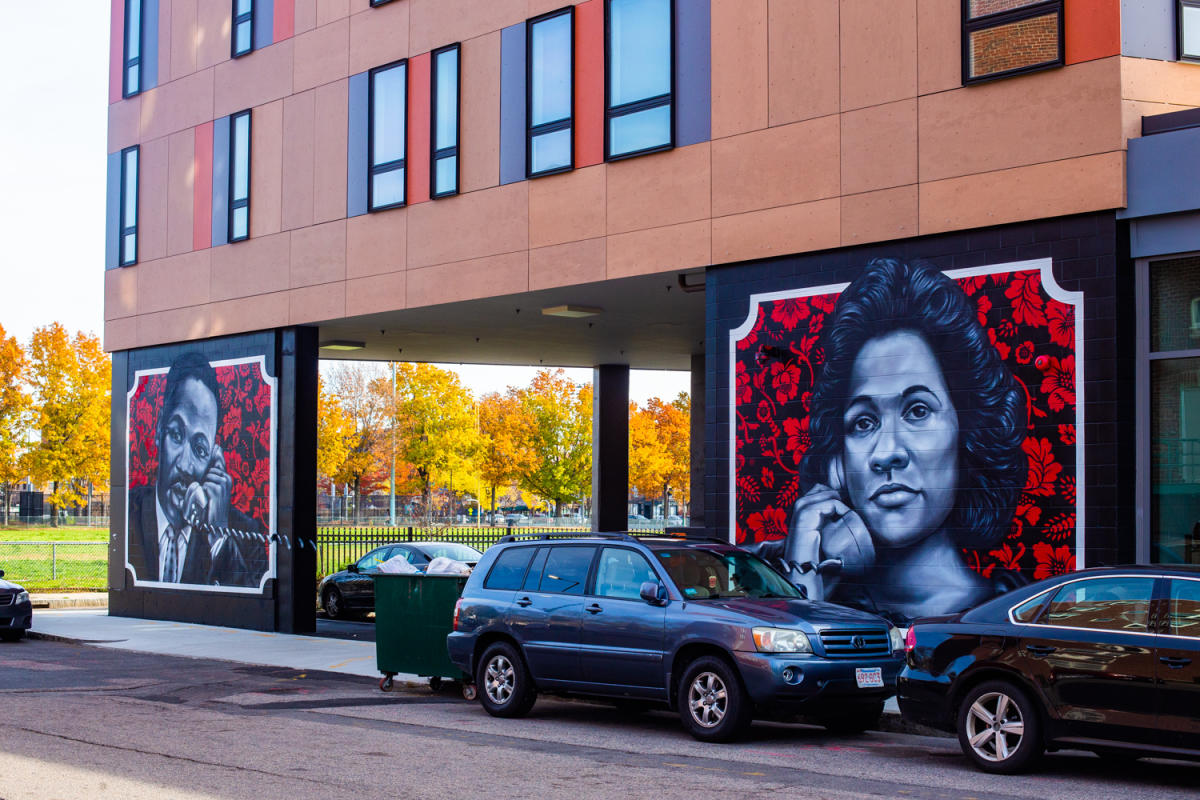 "Roxbury Love Story" by Rob Gibbs
"Roxbury Love Story" by Rob Gibbs
Meet Boston:
And then, the way you said that energy from there is now still within the current community. Something crystallized to me there when you said that. But I'd like for you guys both if you want, to talk about that, to talk about nostalgia and how nostalgia is a touchstone for how it's moved forward, we need to move forward, if you understand what I'm trying to get to.
Rob Gibbs:
I feel like for an area that raised me. There's a lot of things that are different now. For a lot of us, it's a responsibility to keep that feeling and to have that welcomeness for the next generation to come up or the next body of people who have these experiences to just kind of know what was there, to know where they're going. I've been able to practice my whole childhood, teenage life and young adult, in this particular area.
I went to high school at the largest campus in the city on purpose. I could have gone anywhere else to feel like the education was worthwhile, but I felt like I needed to be here to be in class with my classmates, to help them come up from the situation, not out of it, or of it. Felt the need to work at a central branch YMCAs to make sure that the young people in the community were receiving some level of guidance from somebody who came up in the same area.
To start out my career as a visual artist in a studio that was located over there on Thayer Street, not too far from where everything was within walking distance. And you had to really discover the jewels that were in your area and benefit from it and help others see that, as well, so you're not looking down upon an area that brought up who are now - leaders and trendsetters.
There was a separation in reference to just neighborhood activity, whether you were from one block or another, but it was the unification of going to a barbershop to get your hair cut and just the practice of that fellowship and how you can take that just about anywhere in this planet. There is the storytelling from what your grandmother and your cousins are doing in reference to the area. The styles, the family photos that you can refer to in the photo albums. The rides on the elevated train that go Downtown, to catch a double feature on a Saturday, the rooftops that I've seen, all that value.
And just to know that there's a historical underlay to that, it is the foundation to what keeps the soil rich and the things that we grow as pure as it's always been. We are now individuals who not only as stakeholders, but we were responsible for welcoming just about everybody who comes here to let them know this is what is of this area.
"It's not about having a dream, packing up and leaving, but it's about exploring and keeping the value in the area that raised us." - Rob Gibbs
Kai Grant:
I feel like our community, Roxbury in general has really embraced the transplants that have come from all around the world. Typically, people come to go to come to Boston to go to school. They'll stay here to pursue careers within healthcare careers, within technology careers, within the university systems. And so, I think it's important that we are a welcoming community, but we have to first and foremost embrace ourselves and the rich artist community that has given us this continuity of art legacy.
Those are the artists that we pay homage to most. Rob paid homage to over 14 artists in his newer piece. Over 14 artists that include: Paul Goodnight, Dana Chandler, Gary Rickson, Ekua Holmes. But for me, as a young girl growing up in the seventies and eighties in Roxbury, art was extremely important because my step-mom, my bonus mother was one of the major artists inside of Roxbury and created the artwork for the A Nubian Notion sign. That signage was something special to me as a young girl, she had an art studio. We were invited to come into that art studio. She also did artists showcases for us with our family members and friends that would come over and we would display things throughout our home. She was an art teacher, so passing this baton and having a clear line of sight to creating the opportunity and having Roxbury be the hotbed for creative energy was the thing that I've always witnessed throughout my entire life.
She even went as far as to invite street artists into the fold because street artists back in the seventies and eighties were looked upon as criminals, they didn't really have the outlet that they needed. And so, she started a group called the Graffiti Masters at the King School. A lot of the young artists that use Black Market as a platform, or think of Black Market as that artist lab, are now embraced and have a place that's safe where they can create and where they can ideate and where they can expound upon their artistic voices.
Meet Boston:
To someone who might not be familiar with the neighborhood, whether they're a visitor or a transplant or came here for school, haven't come here. And you talked a lot about the creative ecosystem and the experiences in one compact area. Can you talk a little bit about that?
Kai Grant:
In regards to the ecosystem that we've been weaving and creating, I feel like it's a mapping of sorts, in a creative fashion, where we have conceptually changed the idea of what going "Down Dudley" means. We've had to reinvent retail and come up with very witty and creative ideas on attracting those 30,000 footsteps that have come into or through Black Market.
And for us, it's about community. It's community as a network. It's nothing new. It's not something that hasn't been done before, but what's unique about it is our community of artists and artisans are phenomenal. And without the resources, they've been able to create some significant moments within the Nubian Square community or within the Nubian Square commercial district.
Why is that important? That's important because we need to be recognized as a neighborhood inside of the city of Boston that has cultural assets to the degree where those cultural assets now have the opportunity to sustain and support themselves and have a means by which to live.
We want to live, work, play, create and sell within Nubian Square. Those are extremely important tenets for us to keep at the forefront as we are continuing to understand how the world and the globe works within an artist economy.
"It's driven by creativity. It's driven by design. It's driven by innovation. It's driven by disruptive thoughts. And most importantly, it's driven by a spirit of love and collective unity. That's what makes Roxbury very unique in Nubian Square is definitely the place to continue to look at and watch." - Kai Grant
Meet Boston:
Could you tell us a little bit about the genesis of Black Market Nubian?
Kai Grant:
My husband and I are both artists. We have different mediums in which we express ourselves and express our art. We took a trip to Egypt in 2016 and came back impregnated with this idea that we can do something. We didn't exactly know what that something was at that point. And 90 days later, we embarked on another journey to a different part of the African continent and went to Senegal and Morocco. And that is where we started to identify this concept and idea around a marketplace, because marketplaces have been around for millennials thousands of years, and it's something that's indigenous to the African continent. And this idea of cultural exchange, this idea of intergenerational and interpersonal and non-binary exchange was extremely exciting for someone like me who comes out of a retail background and understands creativity from a marketing standpoint and a sales standpoint, not just as a creative artist.
And so, we came home from Egypt and discovered this idea that our friend Nahdra Ra Kiros came up with, which is African Fashion Week, which happens right here in Hibernian Hall. And long story short, we saw the market, the demographic here, we saw who we thought was a guiding force on the revitalization inside of Nubian Square's commercial spaces.
We saw folks that would come and spend their money and look fabulous and have a creative identity right here in this space in Roxbury. And that led us to do some more research and head back to the continent for more creative influence in creative determination. And from that point, when we got back to the States, we hit the ground running and we knew on the coast of Senegal where our ancestors were taken by force and brought over to this part of the world and this part of the United States, that transcontinental exchange can happen. And that global kind of mapping can happen.
And we can take over 25 different artisans and artists that have roots within countries, 25 different countries within the African diaspora, and bring them into this space and kind of create this mashup, so to say, this global transference of artistic joy and bring it here and hope to God that we can continue to do the work as we look for more resources to be sustained.
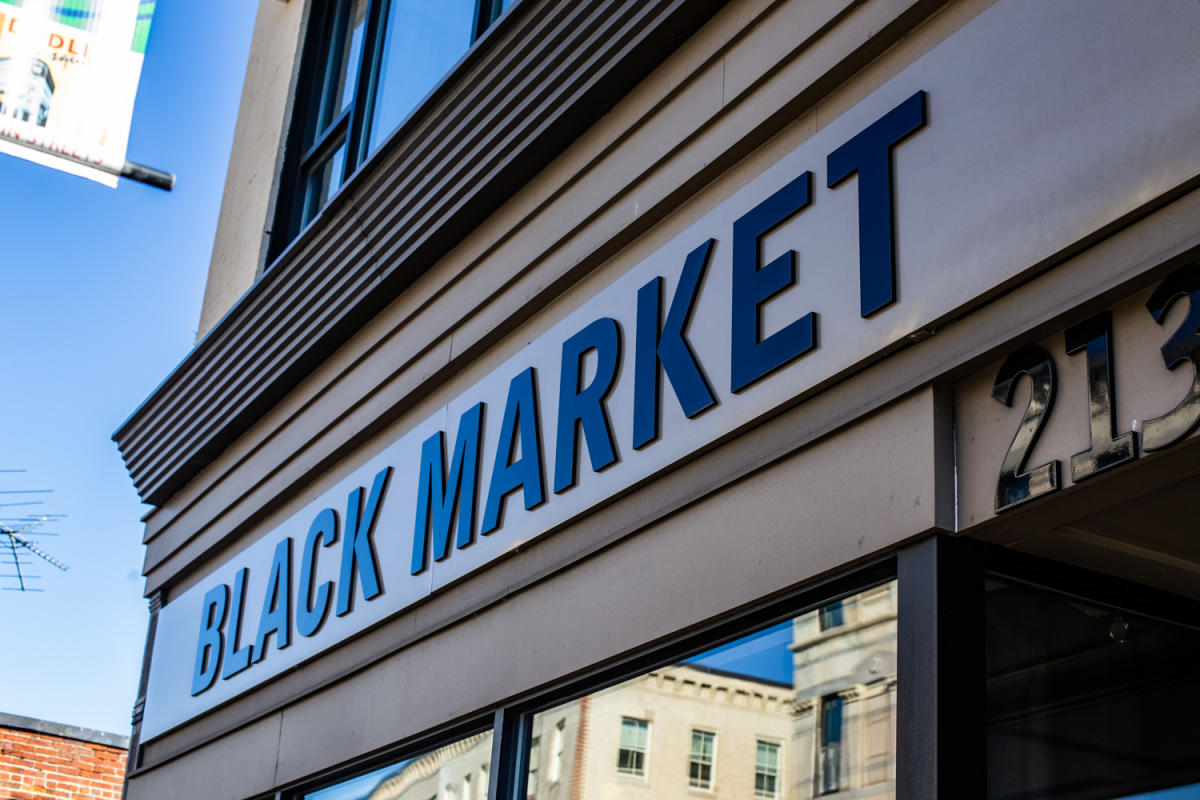
Meet Boston:
Which leads us to the end of the conversation. We all need more resources, infrastructure. This neighborhood certainly does. I want to get both your thoughts on your dream for Roxbury, whether it's five years, 10 years, or for the next generation. What does realizing that look like?
Kai Grant:
For me, the Roxbury dream or the Nubian Square dream that I see is a rebranding and a re-imaging and a re-introduction of ourselves, almost like Jay-Z when he says, "Allow me to reintroduce myself, my name is HOV." For me, that is very symbolic of the spirit of Roxbury. We set the tone when it comes down to creativity and what's real, so when you have a community that's been disenfranchised and hasn't had all of the resources that it deserves to have. We have to dig deeper in terms of how we are going to manifest.
And what does that creative manifestation look like? And so, although I was middle class, I understand being around really strong points of poverty, even I did not necessarily grow up in that. My parents may have grown up around it and been more impacted by it. But myself, I was a middle-class girl growing up in Roxbury. And I grew up in a house that my grandmother owned. It was a two-family. We're on one side, she's on the other.
But I have plenty of friends that come from OP, Orchard Park, which is now Orchard Gardens. And my dad's family grew up here. For us, we had to dig deeper. I looked at an old picture the other day and I don't want to veer too far, but when you're dealing with the way we express ourselves, we've always found creative tools within our own arsenals that we would reinvent or reimagine what a jean jacket would look like and how this directly and intrinsically is tied into hip hop culture, which I grew up in the seventies and eighties, and I'm the hip hop generation.
My parents are Baby Boomers. They express themselves differently. And now, you have the younger side of the hip hop generation and the Millennials taking cues from artists like ProBlak and taking cues from artists like Geo Ortega. And these artistic thought leaders are now passing the baton to the Lee Bairds and the Paul Chapmans the list can go on, but I think I see this as a total rebranding and declaring what our self-identity is and making sure that we control the narrative.
"I see the future of Nubian Square as a rebranding, a re-imagining and a re-ignition of the creative and artistic spirit of the city of Boston. Nubian Square is centrally located inside of the heart of Boston. This is geographically, the center of the city of Boston. It's the heartbeat." - Kai Grant
Rob Gibbs:
Yeah, I would say, I'm just continuing the lineage. I've grown on very fertile and rich soil in Roxbury. And so, I want to continue to provide that for the younger people, including my daughter coming up. Continuing lineages is a practice that shouldn't be slept on, but I feel like the only way you can do it is to show people better than you can tell them.






